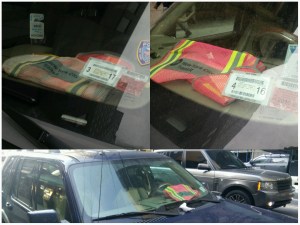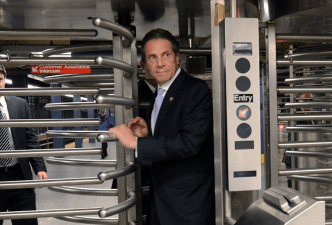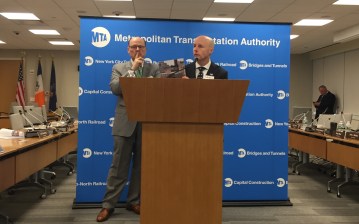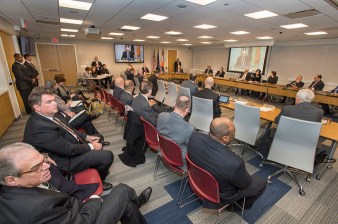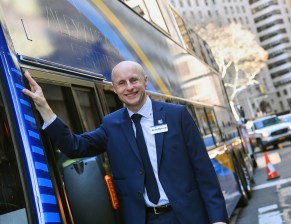Five Takeaways from Andy Byford’s WNYC Interview
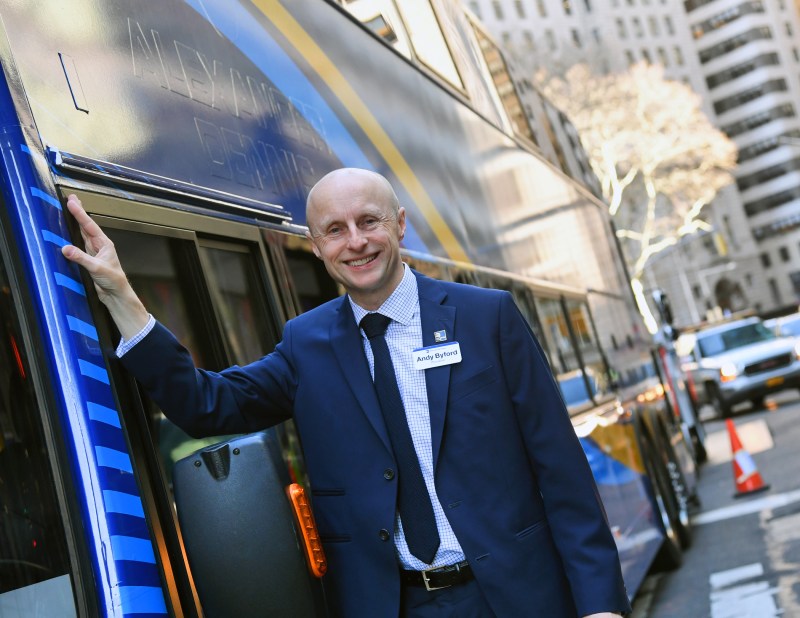
New York City Transit President Andy Byford dropped by for a session with WNYC’s Powerful Official Whisperer Brian Lehrer on Wednesday for a wide-ranging chat on transit service, fare hikes, Amazon and, of course, Gov. Cuomo (who chatted with Lehrer earlier in the week).
Here are the five things you need to know about Byford’s comments:
He will fight service cuts
Early in the interview, Lehrer mentioned reports that the MTA is not only preparing for a scheduled fare hike next year, but will undertake service cuts. Byford pushed back.
“You mentioned service cuts. That is anathema to me,” he said. “I did not come here to preside over that.”
Later, he went deeper.
“I have vetoed certain proposals to close this gap that I felt were Draconian in terms of service,” he said. “That [cutting service] is the worst thing to do as we are trying to get people back on transit. And it’s unreasonable to make a double whammy of fare hikes and service cuts.”
He should probably be running the U.N.
Very good meeting with Andy Byford. People who live in other states get to work in Manhattan faster than my constituents. He knows this is unacceptable. I told him I'm here to be a partner and invited him to my district for a town hall. He agreed. Stay tuned! pic.twitter.com/zSOawVhzRF
— Justin Brannan (@JustinBrannan) November 21, 2018
He did not lobby Amazon to come here
He thinks he’s doing a good job

“Also, we have introduced a completely new way of running our stations to provide very visible, accountable management.”
He said the third thing was “an all-out, relentless focus on basics.”
“The thing that was missing was operational discipline, the nitty-gritty for getting it right,” he said, using a term he employed at least three times in a 20-minute interview. “In October, we delivered the best operating performance for three years on weekdays and four years on weekends. Track fires, down. The number of major incidents, down. For the second month in a row, the target I unilaterally imposed — 10,000 fewer delay incidents — was met.
“There is so much more to do,” he added. “And people see me on the trains every day and say it’s getting better, but the job is way incomplete.”
He admitted that most riders don’t see improvements yet.
“And I get that,” he said. “First off, there’s always a lag between what the data says and what customers feel. And the fact is we’re doing so much work to fix tracks, to fix drains, etc, there are so many personnel on the tracks and that delays trains. I genuinely feel we’re on the right track, but the view that counts is that of my customers.”
He has no use for Manhattan DA Cy Vance
When Byford was asked about fare evasion, he brought up Manhattan DA Cy Vance’s decision earlier this year to stop prosecuting fare evaders — not that the rail-riding diplomat mentioned Vance by name, opting for extremely passive voice for his criticism.
“The DA for Manhattan did announce that there would be a different approach taken to the prosecution of fare evasion. And that has had an impact,” Byford said. He declined to put a dollar figure on how badly NYCT is hurt by riders who don’t pay, saying he will make a full analysis available next month. But he did reiterate his commitment — and not just his personal commitment — to stopping fare evaders where Vance is failing to.
“Fare evasion is a crime,” he said, saying that an enforcement squad known as the Eagle team would soon be spreading out from Select Bus Service enforcement to “regular routes to make sure people have paid their fare.”
“It’s only fair to the great majority of New Yorkers who do pay their fare. … We are certainly not being passive to it,” he said.

